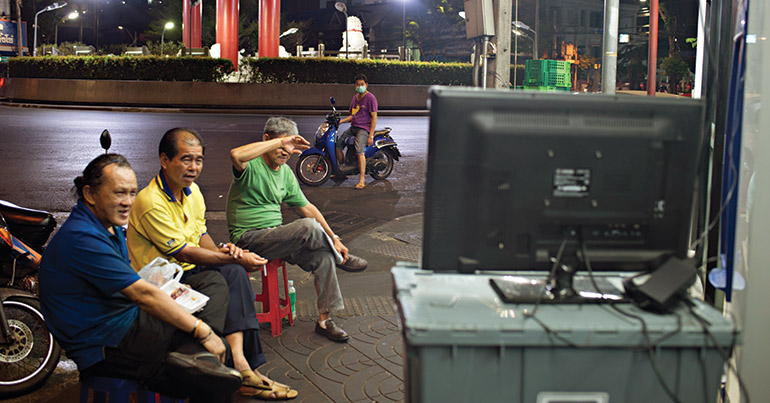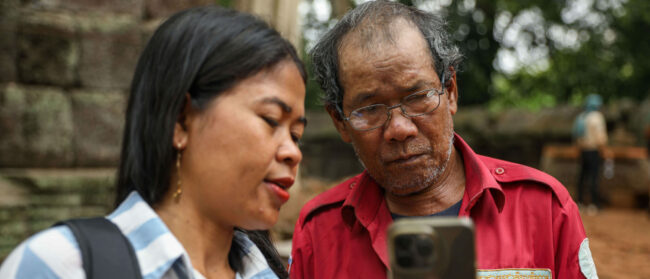Sara Malakul Lane began acting in Thai soap operas when she was just 15 years old. Although she always dreamed of featuring in a romantic kissing scene à la Hollywood, she ended up in eight rape scenes during her ten-year acting career in Thailand.
“The dialogues were always very similar. In the storyline I was raped by the hero, who was characterised as a good man, and I fell in love with him in a happy ending,” explains the 33-year-old actress, who has since moved to the US.

Thailand’s soap operas – screened at prime time when children are often huddled around television sets – regularly depict sexual harassment and rape as a way to seduce a woman or as punishment for bad behaviour.
Several generations of Thai girls have grown up watching their heroines raped on TV by male characters that viewers are coaxed to admire – and who rarely receive any punishment for their crimes. “Rape scenes are not graphic because there is censorship in Thailand. But, although there’s no nudity, it is implicit in the dialogues,” says Lane.
After seeing one of these confronting rape scenes, Nitipan Wiprawit, a 38-year-old architect who regularly watches soap operas with his mother and sister, decided to take action. He complained to Thailand’s National Broadcasting and Telecommunications Commission (NBTC), setting up an online petition to end the normalisation of rape on television. The petition garnered more than 59,000 signatures.
“I asked myself how it is possible that the media shows news of rape as something bad during the daytime, and soap operas can show the same situation as something romantic at night? I wanted to change this attitude [of] showing rape as something normal or acceptable,” he says.
As the first viewer to publicly campaign for change, Nitipan has shown how one person’s actions can spark major alterations.
The first ethical guidelines for television programmes
After his request, Chanettee Tinnam, a media lecturer at Bangkok’s Mahidol University, was tasked with writing the first ethical guidelines for television programmes. These stipulate the need to uphold the “dignity of women”, encourage directors to be cautious when depicting violence against women, advise against showing women as victims and recommend that men’s sexual responsibilities be addressed.
The finalised codes were presented by the NBTC at a ‘women in media’ seminar in April attended by industry representatives, actors and directors, as well as the man who started it all, Nitipan.
Many television soap operas are adapted from old, popular Thai novels that contain storylines where the rape of female protagonists is commonplace. Some of these novels are so popular that they have been adapted into movies and television soap operas multiple times since the 1970s. Koo Kam, for example, has been the source material for six melodramas and four films made as recently as 2013.
It was the 1970s when these stories began to find a wide audience, according to Thai media and sexuality expert Jaray Singhakowinta: “I think [in the 1970s] they captured the Thai mentality. People enjoy watching them and they guarantee high ratings. Producers like this kind of marketing recipe,” he says.
In these soap operas, ‘good’ women or female protagonists are portrayed as sexually naïve, and it is expected that the male characters must initiate a liaison, explains Jaray.
In the Thai language there are two different words used to describe a rape. The first, bplum, is also used to mean “wrestling” and can begin as a forced or violent act that ends in consolidating a relationship, as is depicted in soap operas. The other, khom kheun, is used to describe rape as a criminal act.
For Kosum Omphornuwat, a gender and sexuality studies lecturer at Thammasat University, the omnipresence of rape storylines in Thai soap operas is evidence of the sexism that pervades Thai society. “In rape storylines, women are treated as the property of men, and men may do whatever they wish to their property, including inciting the act of sexual violence in the name of love. The fact that this kind of storyline is popular and accepted says something about Thai society,” she says.
The way that women are represented in advertisements, she adds, is also another example of the alarming focus on women’s bodies. “As it seems in advertisements, the sole purpose of women’s existence is her pursuit of beauty – to be ‘white’, slim and youthful. Her beautiful body is portrayed as the only means to achieve success in life, love and career. Forget about education, intelligence, virtue, integrity and any other qualities. The beautiful body becomes the only means of women’s empowerment,” says Kosum.
The commodification of feminine beauty
As in other patriarchal cultures, femininity is often devalued and reduced to superficial qualities, such as beauty and vanity, says Jaray. “A few weeks ago, I was struck by a TV sport commentator who described a female volleyball player not by her performance, but by her beauty. Femininity – to be precise, feminine beauty – is often valorized and commodified by advertising industries.”
Although Nitipan does not believe that a soap opera rape scene would directly incite a person to carry out sexual violence, he feels that its inclusion in entertainment holds up a mirror to Thai society and the attitudes of police toward rape victims.
According to the Thailand Institute of Justice (TIJ), between 2008 and 2013, an average of 4,000 rape cases per year were reported to the police and 2,400 arrests were made. The organisation estimates that a further 30,000 rapes go unreported each year.
In the past, rape victims were stigmatised by society, or worse, by their own families, explains Siranat Boonthai, a research and campaigns officer at TIJ. “Although the situation has improved over the years – families are more supportive to the victims and tend to encourage them to press charges against the offender – the number of reported rape cases still remains proportionately low when compared to the total rape cases,” he says.
Many fear reporting abuse due to the possible consequences they could face and because police are often unprepared to help female victims due to a lack of women officers and a notoriously insensitive response system. “Victim-blaming questions such as: ‘What were you wearing?’ ‘What were you doing there late at night?’ or ‘Why didn’t you call for help?’ are often asked by the police,” Siranat says.
Following the campaign launched by Nitipan, the public debate about the violence shown in soap operas has grown. As well as providing a reminder of their constructive engagement in shaping Thai society, the new media guidelines come with ramifications for TV stations that fail to comply, including fines, suspension of programme broadcasts or even suspension of the channel’s broadcasting licence.
In July, the NBTC imposed a $1,450 fine on GMM 25 for featuring violent scenes against women in its popular TV series Club Friday To Be Continued. The scene in question showed a woman suffering facial burns after she was forced to put her face to a motorcycle exhaust pipe.
But Jaray says a shift in the cultural mindset, not legislative consequences, is more likely to bring about lasting change. “The most crucial step, and probably long-term solution to this problem, is how the NBTC can educate Thai soap viewers to not accept gendered violence as normal.”


